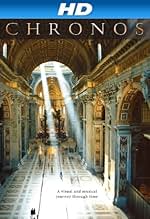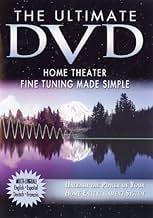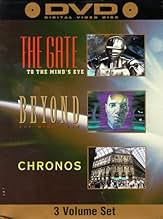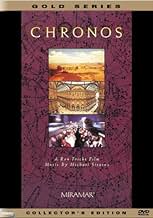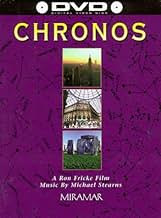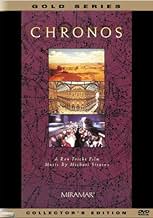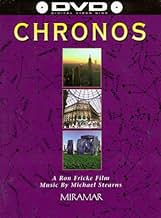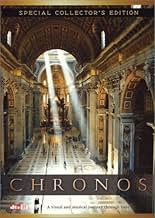IMDb-BEWERTUNG
7,7/10
3958
IHRE BEWERTUNG
Füge eine Handlung in deiner Sprache hinzuCarefully picked scenes of nature and civilization are viewed at high speed using time-lapse cinematography in an effort to demonstrate the history of various regions.Carefully picked scenes of nature and civilization are viewed at high speed using time-lapse cinematography in an effort to demonstrate the history of various regions.Carefully picked scenes of nature and civilization are viewed at high speed using time-lapse cinematography in an effort to demonstrate the history of various regions.
- Regie
- Drehbuch
Empfohlene Bewertungen
Comparisons between "Chronos" (1985) and "Koyanisqaatsi "(1982) are rather inevitable. Both films were written and shot by Ron Fricke, who also directed "Chronos." (Godfrey Reggio directed "Koyanisqaatsi"). Both films are filled with richly poetic images of pristine natural settings counterpointed with man's intrusion into those settings and the evolution of his civilization. As a great admirer of "Koyanisqaatsi," these commonalities are what drew me recently to watching "Chronos" on HD home video. Unfortunately, the comparisons pretty much end there.
"Chronos" is a much less satisfying undertaking. Not only is it merely half the length of its cult-classic predecessor, but it's less than half the film in terms of ambition and coherent vision as well. Whereas "Koyanisqaatsi" had a strong (some would say heavy-handed) political and philosophical message concerning man's corrupting - even diabolical - impact on the globe, "Chronos" doesn't seem to have much point at all behind its slide show alternation of natural and man-made imagery.
To be fair, the film does clearly communicate the notion that the relatively short history of human civilization has bequeathed many majestically beautiful works of art and other grand artifacts, from awe-inspiring pyramids and cathedrals to the great sprawling cities of the world like New York and Paris. Yet, if the point of the film was in part to redress the extremely negative view of man's "progress" delivered by "Koyanisqaatsi," it just doesn't come across very strongly. And, if re-balancing was the point, then what is the audience supposed to make of the frequent used of accelerated motion that suggests to me not only the passage of time alluded to in the film's title but also that man's course has been too rapid and perhaps reckless? It just doesn't add up.
Like "Koyanisqaatsi," "Chronos" relies entirely on image and music to structure its minimal narrative. Neither film offers plot or character in a conventional sense, but "Koyanisqaatsi" manages nevertheless to forge drama by progressively intensifying the conflict of its man versus nature imagery. "Koyanisqaatsi" also benefits from a much more powerful score and from its Native American titular keyword, chanted repeatedly as a choral expression of the film's simple but abstract theme that indeed "life is out of balance." "Chronos" could definitely have benefited from similar devices to give its imagery thrust and significance.
Instead, "Chronos" is essentially a glorified image music piece. Not that there's anything wrong with that. Many of its images are arresting and some - like the city nightscapes - are breathtaking. Though I think not part of its intent, "Chronos" also offers parlor-game amusement for anyone trying to identify the cornucopia of natural, artistic, and architectural wonders that pour past one's eyes. All in all, the film is a pleasurable but forgettable viewing experience.
"Chronos" is a much less satisfying undertaking. Not only is it merely half the length of its cult-classic predecessor, but it's less than half the film in terms of ambition and coherent vision as well. Whereas "Koyanisqaatsi" had a strong (some would say heavy-handed) political and philosophical message concerning man's corrupting - even diabolical - impact on the globe, "Chronos" doesn't seem to have much point at all behind its slide show alternation of natural and man-made imagery.
To be fair, the film does clearly communicate the notion that the relatively short history of human civilization has bequeathed many majestically beautiful works of art and other grand artifacts, from awe-inspiring pyramids and cathedrals to the great sprawling cities of the world like New York and Paris. Yet, if the point of the film was in part to redress the extremely negative view of man's "progress" delivered by "Koyanisqaatsi," it just doesn't come across very strongly. And, if re-balancing was the point, then what is the audience supposed to make of the frequent used of accelerated motion that suggests to me not only the passage of time alluded to in the film's title but also that man's course has been too rapid and perhaps reckless? It just doesn't add up.
Like "Koyanisqaatsi," "Chronos" relies entirely on image and music to structure its minimal narrative. Neither film offers plot or character in a conventional sense, but "Koyanisqaatsi" manages nevertheless to forge drama by progressively intensifying the conflict of its man versus nature imagery. "Koyanisqaatsi" also benefits from a much more powerful score and from its Native American titular keyword, chanted repeatedly as a choral expression of the film's simple but abstract theme that indeed "life is out of balance." "Chronos" could definitely have benefited from similar devices to give its imagery thrust and significance.
Instead, "Chronos" is essentially a glorified image music piece. Not that there's anything wrong with that. Many of its images are arresting and some - like the city nightscapes - are breathtaking. Though I think not part of its intent, "Chronos" also offers parlor-game amusement for anyone trying to identify the cornucopia of natural, artistic, and architectural wonders that pour past one's eyes. All in all, the film is a pleasurable but forgettable viewing experience.
OK I just watched this movie as an attempt to retrace Ron Fricke's filmography. As I find Baraka to be probably the best of all of my all time favorites, I started to watch Chronos with a somehow pervert feeling : "that cannot be better that Baraka" ... In my opinion it's not, BUT I must immediately add that it's a different approach to the reality he shows us, and in its way it's a masterpiece.
-Clearly the "message" here is an attempt to make the spectator aware of the scale of time and its unstoppable pace, along with the fragility and futility of advanced societies if left ungoverned. It's a difficult challenge to make such a movie in terms of techniques it requires and storyline you may actually tell. On this level he has managed to weave it all perfectly well.
-The technical achievement of making a movie of this level of quality with a low budget, on so many locations, with such a high level of consistency in the takes is just MAD technically speaking.
-This was all made in 1985... It's JUST Unbelievable...
-The work Ficke has accomplished with the dynamics of the light is closer to painting than mere filming. Almost all takes have a profound and aesthetic composition, dealing in it's way with the moment of the storyline. So contrary to what some say, it's not JUST filming locations... There is a second level of composition in these frames. Everything is extremely well demonstrated at the last frame of the movie...
-I do not agree that there is no political meaning in this film. It is in my opinion on a parallel with Baraka. There's quite a large amount of Christianity in it, but I am sure that Ron would have put other religions in the film, if he had had the budget in these ancient times (1985 remember)... He did so in Baraka BTW...
On the downside I must admit that on some aspects the film is difficult.
-First the music. It is certainly composed and played with utmost dedication and all the hard work it requires, but after a first watch, I must admit that I had a bit of a rough time with it. It's still quite detailed and interesting, but it sounds outdated and too heavy in its attempts to bring along the viewer with the pace of the movie... It can be perceived as lacking the delicacy and master-mastering of a soundtrack such as Baraka. My main concern is that some tracks sound too much like some early Jean-Michel Jarre compositions and this is quite painful for a fan like me... Certainly that Jean-Michel Jarre would have been a fine composer for a movie like this, but he may not have been aware of it, or not interested in such projects at that time. Overall the music brings you a bit out of the center but it's quite serious music in itself, I must also say.
-The "technicality" of the movie may at some moments take over the viewer. In a sense it can be perceived as boring if you don't read the light behind the scenes. And it's all quite amazing... I think this film is worth a detailed analysis. Certainly that watching it a second time with commentaries must be a real joy...
Overall this a very interesting Ron Frick movie as it is in a sense a preparatory work of Baraka, but there is so much sense in all the frames, that it is also a marvelous and specific experience. To be watched again....
-Clearly the "message" here is an attempt to make the spectator aware of the scale of time and its unstoppable pace, along with the fragility and futility of advanced societies if left ungoverned. It's a difficult challenge to make such a movie in terms of techniques it requires and storyline you may actually tell. On this level he has managed to weave it all perfectly well.
-The technical achievement of making a movie of this level of quality with a low budget, on so many locations, with such a high level of consistency in the takes is just MAD technically speaking.
-This was all made in 1985... It's JUST Unbelievable...
-The work Ficke has accomplished with the dynamics of the light is closer to painting than mere filming. Almost all takes have a profound and aesthetic composition, dealing in it's way with the moment of the storyline. So contrary to what some say, it's not JUST filming locations... There is a second level of composition in these frames. Everything is extremely well demonstrated at the last frame of the movie...
-I do not agree that there is no political meaning in this film. It is in my opinion on a parallel with Baraka. There's quite a large amount of Christianity in it, but I am sure that Ron would have put other religions in the film, if he had had the budget in these ancient times (1985 remember)... He did so in Baraka BTW...
On the downside I must admit that on some aspects the film is difficult.
-First the music. It is certainly composed and played with utmost dedication and all the hard work it requires, but after a first watch, I must admit that I had a bit of a rough time with it. It's still quite detailed and interesting, but it sounds outdated and too heavy in its attempts to bring along the viewer with the pace of the movie... It can be perceived as lacking the delicacy and master-mastering of a soundtrack such as Baraka. My main concern is that some tracks sound too much like some early Jean-Michel Jarre compositions and this is quite painful for a fan like me... Certainly that Jean-Michel Jarre would have been a fine composer for a movie like this, but he may not have been aware of it, or not interested in such projects at that time. Overall the music brings you a bit out of the center but it's quite serious music in itself, I must also say.
-The "technicality" of the movie may at some moments take over the viewer. In a sense it can be perceived as boring if you don't read the light behind the scenes. And it's all quite amazing... I think this film is worth a detailed analysis. Certainly that watching it a second time with commentaries must be a real joy...
Overall this a very interesting Ron Frick movie as it is in a sense a preparatory work of Baraka, but there is so much sense in all the frames, that it is also a marvelous and specific experience. To be watched again....
In Greek mythology, Chronos is said to be the personification of time. Taking that into consideration, you might assume that this would be the longest of the films that Ron Fricke was involved with but actually the opposite is true. Chronos comes in at just under 45 minutes making it a short but sweet trip around some of the world's most beautiful man-made and geological structures.
For those looking for a longer trip as well as more to think about when the film is over, I highly recommend Powaqqatsi at 99 mins, Baraka at 96 mins, and Koyaanisqatsi at 87 mins - but you should probably skip Naqoyqatsi at 89 mins because its the weakest of the Qatsi trilogy. Whereas Naqoyqatsi's seizure inducing mechanical/digital messages drench the experience, Chronos is the exact opposite.
Chronos is sort of a Baraka "lite". This does not have the music of Philip Glass or the socio-political messages, but the beauty on display should make up for it. Additionally Fricke experiments with different exposures and filters (not seen in the other films) to create some striking effects. If you get the chance to see it, definitely take this one for a spin.
Fricke has a new film coming out soon (should be sometime this year) called Samsara which is a sequel to Baraka, and if that doesn't fill the gap you can check out Anima Mundi (by Reggio about animals), Microcosmos (about insects) and Atlantis (by Luc Besson) which is like a scuba dive.
For those looking for a longer trip as well as more to think about when the film is over, I highly recommend Powaqqatsi at 99 mins, Baraka at 96 mins, and Koyaanisqatsi at 87 mins - but you should probably skip Naqoyqatsi at 89 mins because its the weakest of the Qatsi trilogy. Whereas Naqoyqatsi's seizure inducing mechanical/digital messages drench the experience, Chronos is the exact opposite.
Chronos is sort of a Baraka "lite". This does not have the music of Philip Glass or the socio-political messages, but the beauty on display should make up for it. Additionally Fricke experiments with different exposures and filters (not seen in the other films) to create some striking effects. If you get the chance to see it, definitely take this one for a spin.
Fricke has a new film coming out soon (should be sometime this year) called Samsara which is a sequel to Baraka, and if that doesn't fill the gap you can check out Anima Mundi (by Reggio about animals), Microcosmos (about insects) and Atlantis (by Luc Besson) which is like a scuba dive.
You have to listen to the commentary track on the special edition DVD to understand this movie. Many scenes were shot not only in time lapse but also with multiple exposures and multiple frame printing. Because of this we are able to view scenes which are not ordinarily recordable on film in places where artificial lighting is not permitted. This is as close as we will ever get to seeing these places without actually being there.
A supplementary featurette also explains the origins of the music and unique instruments which were used to record it.
Critics should bear in mind that this movie was shot in 1985 on a shoestring budget with a home made camera at a time when IMAX was in its infancy. As such it is a staggering achievement and a landmark movie in the history of cinematography.
A supplementary featurette also explains the origins of the music and unique instruments which were used to record it.
Critics should bear in mind that this movie was shot in 1985 on a shoestring budget with a home made camera at a time when IMAX was in its infancy. As such it is a staggering achievement and a landmark movie in the history of cinematography.
Space, time and matter. While the first might have started at the birth of the universe and the later is created and destroyed everyday, time stands alone. It cannot be undone and if there is anything that can resist time, it is time itself. In this sense time is the most mysterious. Is it even real? Is it only a creation of mankind to explain the beginnings and the ends? In Greek Mythology, Chronos is known to be the god of time. In this sense, Ron Fricke is trying to unite both conceptions of time through vast, open spaces and closed, personal areas. In his film, he tried to put the matter and space in perspective, showing that time had a greater influence.
When it came out, Chronos was considered as a very advanced, an "ahead of its time" kind of movie. The ground breaking Koyaanisqatsi was nearly 5 years old. The technical attributes of the movie were far greater than what could be found in popular, conventional cinema. The synthesized music was relatively new to the world and Michael Stearns was already establishing himself as both a leader and a pioneer in the ambient music department, even creating a particular instrument for the film. And of course, when Chronos came out back then, similar movies were hard to find.
Needless to say: Chronos relied heavily on the overall technology of 80's.
Nowadays, the technical attributes found in Chronos have been beaten by other movies. Music can now be created with complex, yet easy to use programs by using extremely effective computers which can produce an almost infinite number of sounds, effects, etc.. And finally, there are many similar movies nowadays, and we can find time lapse captures everywhere from typical Hollywood movies to televised advertisements.
This now leads people to believe that this movie is unoriginal, lacking depth and that the music is not good. As ironic as it sounds, Chronos is slowly being killed by time itself, whether it be real or not. But that does not mean that the movie is now bad today. Of course, there are obstacles that the viewer must surpass in order to view the movie and to think " Let's compare it to other movies in the 80's ".
When criticizing this movie, many people will compare it to Baraka ( which was made many years later, must I add ) and automatically point out the obvious: It's always the same areas, the music is always the same, the overall "message" is lacking.
Fricke didn't have the budget he had for Baraka. Stearn's music was innovative and fresh at the moment and yes, there is a "message" in Chronos, you just didn't take the "time" to see it.
In Baraka, the message concerning spirituality and humanity is easier to understand for a simple reason: Ron Fricke did it on purpose. The most important religions and areas of the world are shown. The whole movie is made in a way to connect with the entire world. In this sense, Baraka is a movie about the Earth and its inhabitants and what is around and beyond it. You will notice that in Baraka there are things you can easily understand and point out while there are others more obscure themes that you might not even notice.
Chronos is far more complicated for the viewer. While Baraka is still an experimental film, it is not an abstract film. Chronos is both an experimental and abstract film. In this sense, it is way harder for the viewer to acknowledge Chronos to actually have a meaning and to make something out of it.
This shows how Ron Fricke truly is a mastermind when it comes to giving other people the opportunity to come out with their own interpretations of his movies. A short comparison with Geoffrey Reggio ( Fricke's partner ) can be made. While Reggio builds his movies on a specific message which make the viewer think after watching the films, Fricke chooses to make the viewer think while he his still watching. Most viewers will often try to find a meaning to Chronos after watching it or they will try to associate a specific series of scenes.
Of course, Chronos is not as good as Baraka. I believe everyone can agree on this. But everyone should all agree that Chronos was some sort of cinematic homework for Fricke. Not only was it his first own film, but he was also stepping on a different kind of path than Reggio's. He actually found his own path, his own style, a cinematic trademark. And for this originality and advance in film, Chronos deserves to be considered as a good movie. Not the best, but one of the good.
When it came out, Chronos was considered as a very advanced, an "ahead of its time" kind of movie. The ground breaking Koyaanisqatsi was nearly 5 years old. The technical attributes of the movie were far greater than what could be found in popular, conventional cinema. The synthesized music was relatively new to the world and Michael Stearns was already establishing himself as both a leader and a pioneer in the ambient music department, even creating a particular instrument for the film. And of course, when Chronos came out back then, similar movies were hard to find.
Needless to say: Chronos relied heavily on the overall technology of 80's.
Nowadays, the technical attributes found in Chronos have been beaten by other movies. Music can now be created with complex, yet easy to use programs by using extremely effective computers which can produce an almost infinite number of sounds, effects, etc.. And finally, there are many similar movies nowadays, and we can find time lapse captures everywhere from typical Hollywood movies to televised advertisements.
This now leads people to believe that this movie is unoriginal, lacking depth and that the music is not good. As ironic as it sounds, Chronos is slowly being killed by time itself, whether it be real or not. But that does not mean that the movie is now bad today. Of course, there are obstacles that the viewer must surpass in order to view the movie and to think " Let's compare it to other movies in the 80's ".
When criticizing this movie, many people will compare it to Baraka ( which was made many years later, must I add ) and automatically point out the obvious: It's always the same areas, the music is always the same, the overall "message" is lacking.
Fricke didn't have the budget he had for Baraka. Stearn's music was innovative and fresh at the moment and yes, there is a "message" in Chronos, you just didn't take the "time" to see it.
In Baraka, the message concerning spirituality and humanity is easier to understand for a simple reason: Ron Fricke did it on purpose. The most important religions and areas of the world are shown. The whole movie is made in a way to connect with the entire world. In this sense, Baraka is a movie about the Earth and its inhabitants and what is around and beyond it. You will notice that in Baraka there are things you can easily understand and point out while there are others more obscure themes that you might not even notice.
Chronos is far more complicated for the viewer. While Baraka is still an experimental film, it is not an abstract film. Chronos is both an experimental and abstract film. In this sense, it is way harder for the viewer to acknowledge Chronos to actually have a meaning and to make something out of it.
This shows how Ron Fricke truly is a mastermind when it comes to giving other people the opportunity to come out with their own interpretations of his movies. A short comparison with Geoffrey Reggio ( Fricke's partner ) can be made. While Reggio builds his movies on a specific message which make the viewer think after watching the films, Fricke chooses to make the viewer think while he his still watching. Most viewers will often try to find a meaning to Chronos after watching it or they will try to associate a specific series of scenes.
Of course, Chronos is not as good as Baraka. I believe everyone can agree on this. But everyone should all agree that Chronos was some sort of cinematic homework for Fricke. Not only was it his first own film, but he was also stepping on a different kind of path than Reggio's. He actually found his own path, his own style, a cinematic trademark. And for this originality and advance in film, Chronos deserves to be considered as a good movie. Not the best, but one of the good.
Wusstest du schon
- WissenswertesComposer Michael Stearns used an instrument called the Beam to generate many of the sounds for this film, which is 12 feet long made of extruded aluminum with 24 piano strings from 19-22 gauge. The original instruments it was based upon were made from cast iron and difficult to move around.
- VerbindungenReferenced in Silicon Valley Timelapse (2008)
Top-Auswahl
Melde dich zum Bewerten an und greife auf die Watchlist für personalisierte Empfehlungen zu.
Details
- Erscheinungsdatum
- Herkunftsländer
- Offizieller Standort
- Sprache
- Auch bekannt als
- Хронос
- Drehorte
- Produktionsfirmen
- Weitere beteiligte Unternehmen bei IMDbPro anzeigen
- Laufzeit43 Minuten
- Farbe
- Seitenverhältnis
- 1.78 : 1
Zu dieser Seite beitragen
Bearbeitung vorschlagen oder fehlenden Inhalt hinzufügen


